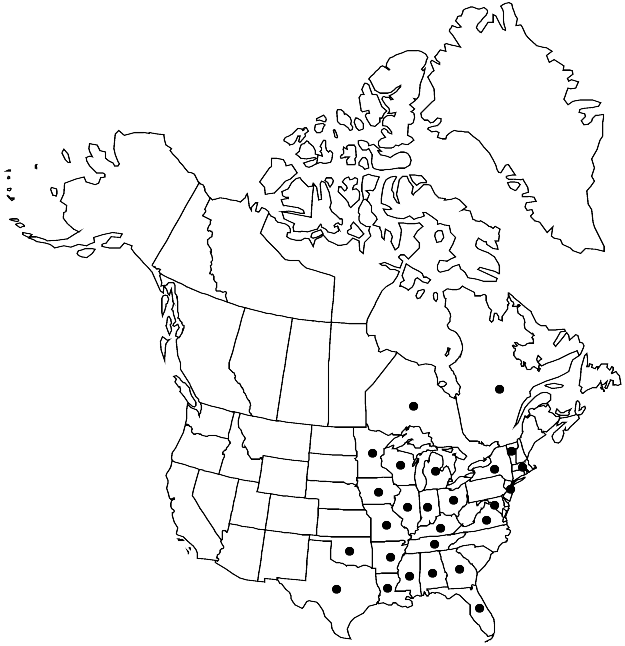Rorippa aquatica
Ann. Missouri Bot. Gard. 22: 550. 1935.
Perennials; (submerged aquatic with emergent flowering branches, rhizomatous, rooting from proximal nodes); glabrous throughout. Stems erect, unbranched or often branched distally, 3–8.5 (–11) dm. Basal leaves absent. Cauline leaves: submerged shortly petiolate, emergent sessile or petiolate (to 2 mm); blade: submerged pectinate, finely 1–4-pinnatisect into filiform or capillary segments, emergent lanceolate to oblong, usually undivided, rarely lobed, (1.5–) 2–5.5 (–6.7) cm × (5–) 7–15 (–20) mm, margins entire or dentate. Racemes elongated. Fruiting pedicels divaricate to horizontal or slightly reflexed, straight or curved, (5–) 7–15 mm. Flowers: sepals (deciduous after anthesis), ascending, oblong, 2–4 × 1.4–1.8 mm; petals white, spatulate to obovate, 4–8 × 2–3.5 mm; median filaments 3–4 mm; anthers linear, 1.7–2.2 mm. Fruits silicles, straight, oblong to ellipsoid, 4–7 × 2.5–3 mm; (septum reduced to a rim); ovules 48–80 per ovary; style 2–4 mm; (stigma slightly 2-lobed). Seeds biseriate, brown to reddish, ovoid, 0.7–0.8 mm (0.5–0.6 mm diam.), reticulate. 2n = 24.
Phenology: Flowering Apr–Aug.
Habitat: Springs, lakes, ditches, streams, open sloughs, swamps
Elevation: 0-200 m
Distribution

Ont., Que., Ala., Ark., D.C., Fla., Ga., Ill., Ind., Iowa, Ky., La., Mass., Mich., Minn., Miss., Mo., N.J., N.Y., Ohio, Okla., Tenn., Tex., Vt., Va., Wis.
Discussion
Submerged leaves of Rorippa aquatica often detach readily and produce adventitious buds from which new plantlets develop. The infrequent production of seeds in this species may indicate that it is self-incompatible and that most or all plants within a given population might be the result of asexual reproduction. It appears to prefer slow, unpolluted, running water. The apparent wide distribution does not reflect how uncommon the species is in any given area. Based on the relatively small number of recent collections in major herbaria, it is likely that most of the county records given by I. A. Al-Shehbaz and V. M. Bates (1987) reflect populations that have disappeared.
Selected References
None.
Lower Taxa
"elongated" is not a number."thick" is not a number."dm" is not declared as a valid unit of measurement for this property."dm" is not declared as a valid unit of measurement for this property.